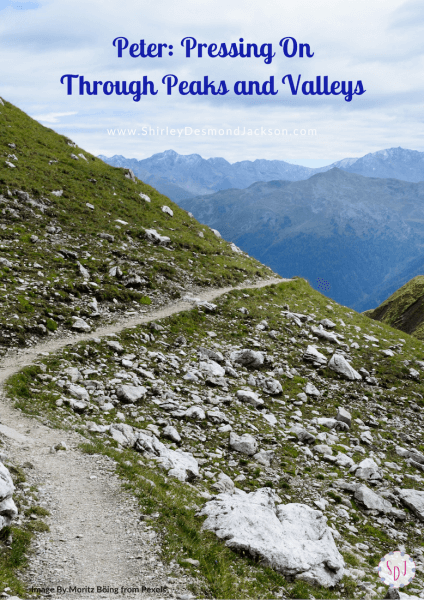
Subscribe to receive a FREE Bible Study!
Share this page

How To Move Forward From Our Past Mistakes And Regrets
May 8, 2024
“No one who puts a hand to the plow and looks back is fit for service in the kingdom of God.” — Luke 9:62 (NIV)
Sighing, I looked at my phone. Three am. Once again my thoughts began replaying the painful memories of my past mistakes and regrets. I know I’ve said and done helpful things. But in the middle of the night I only remember the words I wished I’d never said and the things I wished I’d never done.
I can’t explain why this happens. But the findings of a group of researchers at Duke University tell me I’m not alone. According to their study, people tend to remember the memories of their moral transgressions ~ their past mistakes and regrets ~ more vividly than those of rewarding or neutral events.
Remembering our past transgressions can help us avoid repeating them. But we need to learn the lesson and move forward. Focusing on our past failures keeps us stuck in regret and steals our hope for change. This is especially true in our walk with the Lord.
Jesus put it this way:
“No one who puts a hand to the plow and looks back is fit for service in the kingdom of God.” (Luke 9:62 NIV)
Jesus spoke these words to a man who wanted to follow Him, but only after he went back to say good-bye to his family (Luke 9:61). When I read this through the lens of my modern western worldview, the man’s request seems reasonable. To gain clarity, I need to look at the passage in the context of the ancient Hebrew worldview.
The Greek word apotassó is translated as “say good-bye”. But it means more than just running back and saying a quick farewell. The word also means “to take leave of” or “to renounce”. A man in the ancient Middle Eastern culture would never put anyone above his father. By his words the man clearly expressed his reluctance to take leave of his father so he could follow Jesus. Yet Jesus remained firm. To follow Him we must be willing to renounce everything else. For the man it meant his father. For me, at this time in my life, it means my past mistakes and regrets. Only when we renounce what holds us back are we able to move forward with Jesus.
This is so clear in the metaphor Jesus gave in this passage. Plowing would be a familiar image to people of His culture. A farmer controlled the plow with one hand and guided the animal with the other one. To keep the furrows straight, he kept his eyes focused on a fixed point directly in front of him. If he looked back, he would lose control of the plow and create crooked furrows. This would be a sign of shoddy work and an embarrassment to the farmer.
If we applied this image to our culture, it would be the equivalent of “taking our eyes off the road” when we are driving. I know of many tragic accidents caused by drivers who lost control of their car because they failed to focus on the road ahead of them.
The message is clear for our spiritual lives as well. We can learn from our past. But to be effective for God, we need to stay present and keep our eyes firmly fixed on the One who leads us.
Dear Lord Jesus, thank You for giving us such a clear image of where our focus needs to be. We pray to learn from our past, but to keep our focus on the present. Help us keep our eyes fixed on You. We pray this in Your name. Amen.
How To Move Forward From Our Past Mistakes And Regrets
May 8, 2024

“No one who puts a hand to the plow and looks back is fit for service in the kingdom of God.” — Luke 9:62 (NIV)
Sighing, I looked at my phone. Three am. Once again my thoughts began replaying the painful memories of my past mistakes and regrets. I know I’ve said and done helpful things. But in the middle of the night I only remember the words I wished I’d never said and the things I wished I’d never done.
I can’t explain why this happens. But the findings of a group of researchers at Duke University tell me I’m not alone. According to their study, people tend to remember the memories of their moral transgressions ~ their past mistakes and regrets ~ more vividly than those of rewarding or neutral events.
Remembering our past transgressions can help us avoid repeating them. But we need to learn the lesson and move forward. Focusing on our past failures keeps us stuck in regret and steals our hope for change. This is especially true in our walk with the Lord.
Jesus put it this way:
“No one who puts a hand to the plow and looks back is fit for service in the kingdom of God.” (Luke 9:62 NIV)
Jesus spoke these words to a man who wanted to follow Him, but only after he went back to say good-bye to his family (Luke 9:61). When I read this through the lens of my modern western worldview, the man’s request seems reasonable. To gain clarity, I need to look at the passage in the context of the ancient Hebrew worldview.
The Greek word apotassó is translated as “say good-bye”. But it means more than just running back and saying a quick farewell. The word also means “to take leave of” or “to renounce”. A man in the ancient Middle Eastern culture would never put anyone above his father. By his words the man clearly expressed his reluctance to take leave of his father so he could follow Jesus. Yet Jesus remained firm. To follow Him we must be willing to renounce everything else. For the man it meant his father. For me, at this time in my life, it means my past mistakes and regrets. Only when we renounce what holds us back are we able to move forward with Jesus.
This is so clear in the metaphor Jesus gave in this passage. Plowing would be a familiar image to people of His culture. A farmer controlled the plow with one hand and guided the animal with the other one. To keep the furrows straight, he kept his eyes focused on a fixed point directly in front of him. If he looked back, he would lose control of the plow and create crooked furrows. This would be a sign of shoddy work and an embarrassment to the farmer.
If we applied this image to our culture, it would be the equivalent of “taking our eyes off the road” when we are driving. I know of many tragic accidents caused by drivers who lost control of their car because they failed to focus on the road ahead of them.
The message is clear for our spiritual lives as well. We can learn from our past. But to be effective for God, we need to stay present and keep our eyes firmly fixed on the One who leads us.
Dear Lord Jesus, thank You for giving us such a clear image of where our focus needs to be. We pray to learn from our past, but to keep our focus on the present. Help us keep our eyes fixed on You. We pray this in Your name. Amen.

Recent Comments